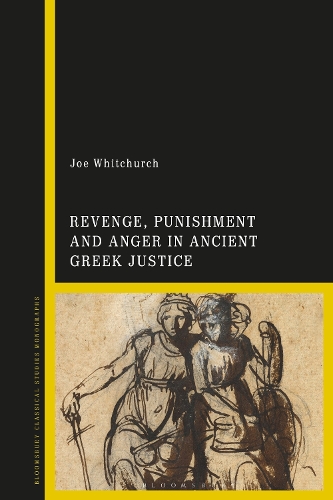
Revenge, Punishment and Anger in Ancient Greek Justice
(Hardback)
Available Formats
Publishing Details
Revenge, Punishment and Anger in Ancient Greek Justice
By (Author) Joe Whitchurch
Bloomsbury Publishing PLC
Bloomsbury Academic
3rd October 2024
United Kingdom
Classifications
Tertiary Education
Non Fiction
340.538
Physical Properties
Hardback
288
Width 157mm, Height 234mm, Spine 20mm
590g
Description
Anger was the engine of justice in the ancient Greek world. It drove quests for vengeance which resulted in a variety of consequences, often harmful not only for the relevant actors but also for the wider communities in which they lived. From as early as the seventh century BCE, Greek communities had developed more or less formal means of imposing restrictions on this behaviour in the form of courts. However, this did not necessarily mean a less angry or vengeful society so much as one where anger and revenge were subject to public sanction and sometimes put to public use. By the fifth and fourth centuries, the Athenian polis had developed a considerably more sophisticated system for the administration of justice, encompassing a variety of laws, courts, and procedures. In essence, the justice it meted out was built on the same emotional foundations as that seen in Homer. Jurors gave licence to or restrained the anger of plaintiffs in private cases, and they punished according to the anger they themselves felt in public ones. The growing state in ancient Greek poleis did not bring about a transition away from angry private revenge to emotionless public punishment. Rather, anger came increasingly to move into the public sphere, the emotional driver of an early state that defended its community, and even itself, through its vengeful acts of punishment.
Reviews
This book answers a very important question: how did state formation and legal institutions change the ways in which the Greeks of the Archaic period dealt with vendettas and personal revenge The author elegantly bridges the gap between the Homeric world of the hero and the reality of Athenian courts, demonstrating convincingly the similarities between the two societies in their perception of anger and its consequences for the community. -- Julietta Steinhauer, Associate Professor of Ancient History, University College London, UK
Author Bio
Joe Whitchurch is an independent scholar, UK. He has recently completed his PhD at University College London, UK, and has published work on the subject of anger and punishment in ancient Greece.
